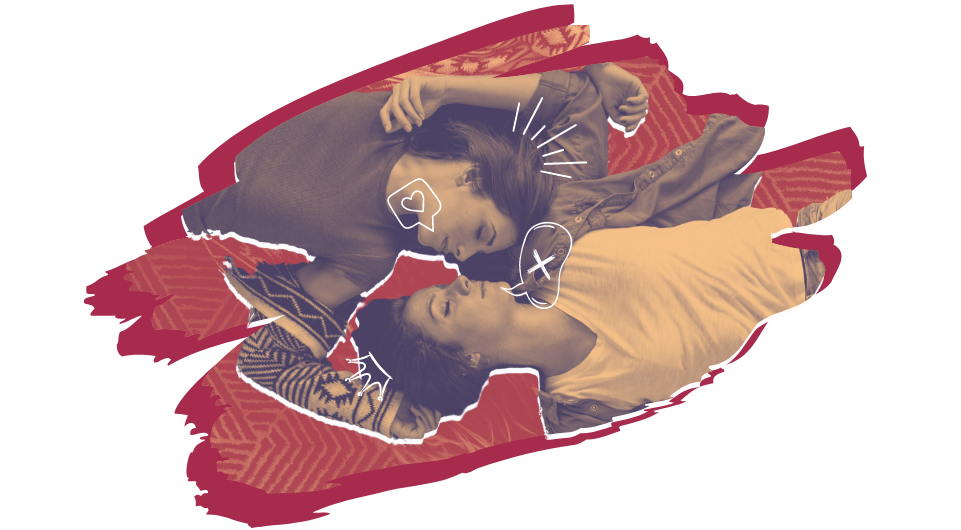Toxic relationships
Toxicity, gaslighting, psychological abuse and unhealthy relationships: all the stuff you need ...
READ METhe truth about abuse: myths, facts and shining a light on victim-blaming

This article was written with the support of Project Paradigm – experts in protecting teens from sexual exploitation.
They should be fun, loving and give you insight into yourself. Most of all, they should be safe. An abusive relationship can have lasting effects on your safety, life, health, and mental health. Being educated about abuse can help stop abuse from happening.
Here’s the stuff you need to know.
"If the abuse is that bad, they can just leave."
People who experience abuse are most at risk of severe violence at three key moments:
This can make leaving an abusive relationship very dangerous.
People who abuse others deliberately use physical, financial, and emotional abuse in order to isolate and control the person they are abusing, This also makes it very hard for them to leave.

"Violence and abuse are caused by mental health issues or anger issues."
Some people who abuse others may have mental health issues, a history of trauma, etc. However, many, many people with mental health issues, a history of trauma or anger issues do not abuse others.
People who abuse choose who they abuse, when they abuse and how they abuse. They are able to refrain from abusing when it suits them. (This means they are able to control themselves when it's beneficial for them – e.g. they don’t abuse their boss at work even when they’re really angry).
Abuse isn't caused by 'losing control', rather it's a desire to control or have power over others (as well as many other complicated factors).

"Only certain types of people abuse or experience abuse."
People who are abused can feel trapped due to fear that no one will believe them because the person who abuses them seems like a 'great person' to others; and has often done things as part of the abuse to make it really hard to talk to other people.
People of any age, social class, religion, culture, sexual orientation and relationship status can experience or perpetrate abuse. The main thing people who abuse have in common is abusive behaviours.
People who abuse can seem like nice, respectable people to others in their communities. You can't tell just by looking at someone if they abuse other people or not.

"It's not really abuse unless it involves violence."
Not all abuse is physical. Abuse can take many different forms. And not all relationships with violence start off violently.
Violence in abusive relationships starts slowly and increases in frequency and severity over time (everyone is on their 'best behaviour' early in a relationship). Early warning signs of future violence include other types of abuse (listed below).
Violence can also taper off over time. Once the person doing the abusing has control over someone else, they might stop using violence altogether. Or they might only use violence occasionally, e.g. to surprise the person they’re abusing, to keep them off balance, or in certain circumstances, such as where they suspect the person they’re abusing is about to leave.

"People who are abused are sometimes responsible for the abuse. They shouldn't provoke the person abusing them.”
People who abuse are denying the people they abuse their basic human rights.
People who are abused are NEVER responsible for the actions of the people that abuse them. They do not have control over when, how or even whether that person chooses to abuse. The only people responsible for abuse are the people who abuse.
Everyone has a right to be safe at all times, in all situations. No one 'gives' you this right. It's yours just because you are a person.

"People sometimes lie or exaggerate about being abused."
Disbelieving people who are abused is a form of victim-blaming, and plays a big role in allowing abuse to continue.
Research shows that people don’t lie or exaggerate the abuse
People who are abused often downplay abuse for various reasons, including wanting to protect the person abusing them, fear that intervention will make the abuse worse, or even the belief that the person abusing them is sorry/will change their behaviour.
When abuse is non-violent, it can be hard to recognise that it is actually abuse for the person being abused AND for others.

"Abuse is a personal problem that needs to be worked out between partners."
Abuse is a social and community problem. It's everyone's responsibility to prevent and stop abuse. What you ignore, you condone. What you condone has permission to keep on happening.
Things like calling out sexist jokes, disrespect and victim-blaming in your social circle can go a long way towards making the world safer.
Abuse doesn't exist in a bubble. Little, everyday things contribute to a culture of accepting abuse. It's not enough to not be abusive. You have to be anti-abuse and stand up against abuse of all kinds
If you think you are in an abusive relationship, or are concerned about a friend who may be in an abusive relationship, there are ways to get help and stay safe.
People who abuse others use victim-blaming as a deliberate tactic to get away with abuse. It's known as 'DARVO' - 'deny, attack, and reverse victim and offender'.
But why do 'good people' sometimes victim blame? Our brain doesn't like not being in control. If it can find a way to make things like abuse our own fault, it feels like it can prevent it and stay safe. E.g., “They were sexually assaulted because they were drinking. I don’t drink so I’m safe from sexual assault.”
For people who aren't the victim, victim-blaming other people can help them feel safer, e.g. “This bad thing won't happen to me because I do x, y, & z - therefore I'm safe.” But these beliefs are untrue and can actually be harmful.
Often, a victim is described as having had something just 'happen' to them, "they were assaulted" rather than "the person assaulted them."
This removes the responsibility from the person doing the abuse and makes it seem like the victim may have gotten themselves into this situation.
Rewording things to focus on caring for the victim helps support victims and plays a powerful role in preventing crimes, abuse and harm in the future.
Remember: the only thing that causes abuse is a person who chooses to abuse.
Our society can make victims seem less credible, by focusing on them instead of the person who abused them. They might say things like, “Why didn’t you fight back?” (even when we know that going into ‘freeze mode’ is really common in abuse), or question whether a person is reliable because they were drinking alcohol or taking drugs, etc.
Our society can also blur the lines between abuse and exploitation and ‘consent’ by making victims or people who are underage seem like they caused the abuse or profited off it. For example, the media may make it seem like an underage teen girl was super mature for her age and ‘took advantage’ of an older male celeb and ‘seduced’ him.
Or, in a high-profile domestic violence case, they’ll paint the person who was abused as being abusive back, or of ‘provoking’ the person doing the abuse.
Porn and even music can make it seem like victims really ‘wanted’ what happened to them (and they were totally turned on by it).
This is often a tactic used by people who abuse to discredit people who have experienced abuse – by making them seem like they weren’t a ‘perfect victim’ - and it’s another form of victim-blaming. In fact, people who abuse often deliberately target people who they think ‘won’t be believed’. They are purposely creating ‘imperfect victims’ to get away with abuse.
A person experiencing abuse is never to blame. No one deserves to be abused. If you are – or someone you care about is - experiencing abuse, there are people and services who can help. Here’s a great starting point: your guide to safety.
You can play a big role in preventing abuse and supporting people who have been abused. We all have a responsibility to stop abuse. Little, everyday actions can make a big difference. Here’s some things you can do:
Politely call them out on their victim-blaming. Show you disapprove with what's being said (especially if they’re making a joke about it), e.g. saying "that's not funny/ok.” Or act like you don’t understand. “I don’t get it – explain it to me.” This can be a real power move – because having to explain a joke that ‘punches down’ (i.e. harms vulnerable people) suddenly makes it very not funny and shows how problematic it is.
Show empathy for people who have experienced abuse, e.g. "That must have been an awful experience for them, and they have shown a lot of courage to come forward like that."
Share information. You could talk about how rare false allegations are or how many crimes go unreported.
Toxic relationships
Toxicity, gaslighting, psychological abuse and unhealthy relationships: all the stuff you need ...
READ MESextortion: What it is and what to do about it
‘Sextortion’ is a type of image-based abuse that can happen online. If ...
READ MEAbuse in adult relationships
Learn about the different forms of abuse in relationships and where to ...
READ MEMy friend’s partner is abusive
If you’re worried that your friend is in an abusive relationship, ...
READ ME
Talking helps! We’re here for you.
No problem is too big or too small.
We're here 24 hours a day, 7 days a week